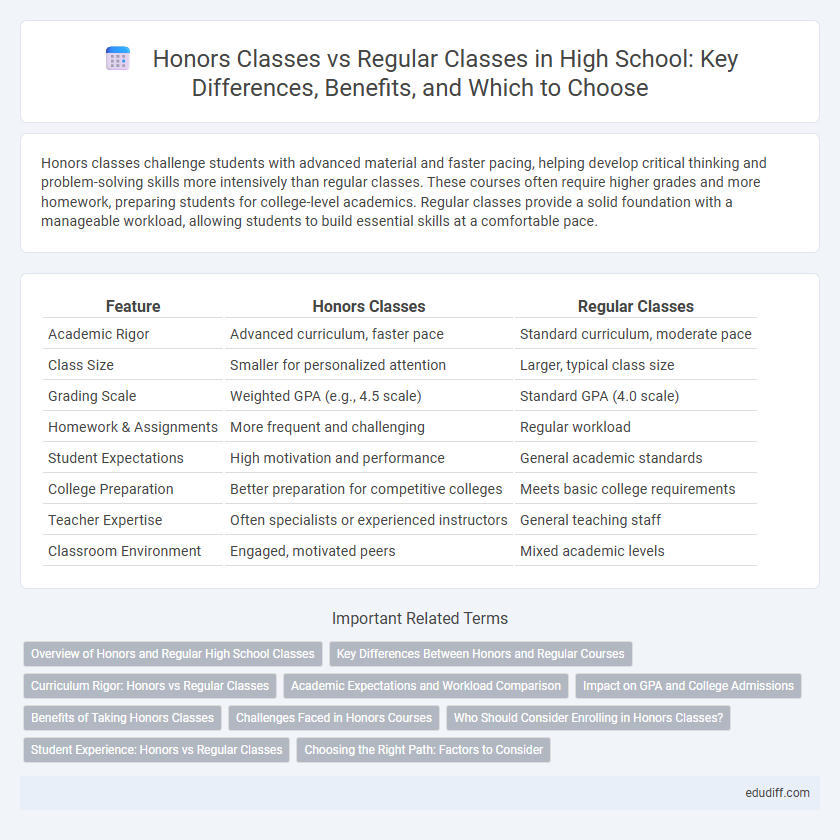Honors classes challenge students with advanced material and faster pacing, helping develop critical thinking and problem-solving skills more intensively than regular classes. These courses often require higher grades and more homework, preparing students for college-level academics. Regular classes provide a solid foundation with a manageable workload, allowing students to build essential skills at a comfortable pace.
Table of Comparison
| Feature | Honors Classes | Regular Classes |
|---|---|---|
| Academic Rigor | Advanced curriculum, faster pace | Standard curriculum, moderate pace |
| Class Size | Smaller for personalized attention | Larger, typical class size |
| Grading Scale | Weighted GPA (e.g., 4.5 scale) | Standard GPA (4.0 scale) |
| Homework & Assignments | More frequent and challenging | Regular workload |
| Student Expectations | High motivation and performance | General academic standards |
| College Preparation | Better preparation for competitive colleges | Meets basic college requirements |
| Teacher Expertise | Often specialists or experienced instructors | General teaching staff |
| Classroom Environment | Engaged, motivated peers | Mixed academic levels |
Overview of Honors and Regular High School Classes
Honors classes in high school offer a more rigorous curriculum with accelerated content, designed to challenge students and prepare them for college-level work, often incorporating advanced critical thinking and in-depth analysis. Regular classes provide foundational knowledge and skills aligned with standard academic requirements, focusing on core subjects with a balanced pace suitable for a broad range of learners. Enrollment in honors classes can impact GPA weighting, college admissions, and eligibility for advanced academic opportunities.
Key Differences Between Honors and Regular Courses
Honors classes in high school offer a more rigorous curriculum with accelerated pace and in-depth content, often requiring higher-level critical thinking and problem-solving skills compared to regular classes. They typically include advanced assignments, increased workload, and expectations for greater student participation and independent study. Regular classes provide foundational knowledge at a standard pace, designed to accommodate a broad range of learning styles and often include more guided instruction and support.
Curriculum Rigor: Honors vs Regular Classes
Honors classes in high school feature a more rigorous curriculum designed to challenge students with advanced concepts, faster pacing, and in-depth assignments compared to regular classes. These courses often include more complex texts, higher-level math problems, and comprehensive science experiments that demand critical thinking and analytical skills. Regular classes cover foundational material at a steady pace, providing broader exposure but less intensive academic challenge than honors classes.
Academic Expectations and Workload Comparison
Honors classes in high school demand higher academic standards and critical thinking skills compared to regular classes, often involving more complex assignments and faster-paced lessons. The workload in honors courses typically includes extensive reading, advanced problem-solving tasks, and frequent assessments designed to deepen understanding and challenge students. Regular classes focus on foundational knowledge with a steady workload, prioritizing mastery of core concepts over accelerated learning.
Impact on GPA and College Admissions
Honors classes typically offer weighted grades, boosting GPA and enhancing class rank compared to regular classes, which usually carry standard weighting; this weighting can significantly impact a student's academic profile. Colleges often favor applicants who challenge themselves with honors coursework, viewing it as an indicator of strong academic ability and motivation. However, maintaining a high GPA in honors classes can be more demanding, so balancing course rigor with performance is crucial for optimizing college admissions prospects.
Benefits of Taking Honors Classes
Honors classes provide rigorous academic challenges that promote critical thinking, advanced problem-solving skills, and deeper subject comprehension. They enhance college applications by demonstrating a student's ability to handle intensive coursework and maintain high academic standards. Students in honors classes often experience increased motivation and access to enriched learning resources that prepare them for future academic success.
Challenges Faced in Honors Courses
Honors classes in high school present increased academic demands, requiring students to master complex materials and complete rigorous assignments at a faster pace than regular classes. These courses often involve critical thinking, in-depth analysis, and extensive reading, leading to heightened stress and time management challenges for students. Balancing honors coursework with extracurricular activities and social commitments requires effective organizational skills and resilience.
Who Should Consider Enrolling in Honors Classes?
Students with strong academic performance and a passion for challenging coursework should consider enrolling in honors classes to enhance critical thinking and deepen subject mastery. Those aiming for competitive college admissions or advanced academic opportunities benefit from the rigorous curriculum and faster pace of honors courses. High schoolers willing to commit extra time to studying and participating actively in class discussions will maximize success in honors classes.
Student Experience: Honors vs Regular Classes
Honors classes offer a more rigorous curriculum that challenges students with advanced materials and faster pacing, fostering critical thinking and deeper subject mastery. Regular classes provide a balanced approach with a standard curriculum aimed at accommodating diverse learning speeds and reinforcing foundational concepts. Students in honors classes often experience greater academic pressure but benefit from enhanced college readiness and enrichment opportunities compared to their peers in regular classes.
Choosing the Right Path: Factors to Consider
Choosing between honors and regular classes in high school depends on academic goals, workload capacity, and college aspirations. Honors classes offer rigorous coursework that can enhance GPA and college applications, while regular classes provide a balanced approach with less pressure. Students should assess their strengths, time management skills, and future plans to select the path best aligned with their success and well-being.
Honors Classes vs Regular Classes Infographic

 edudiff.com
edudiff.com